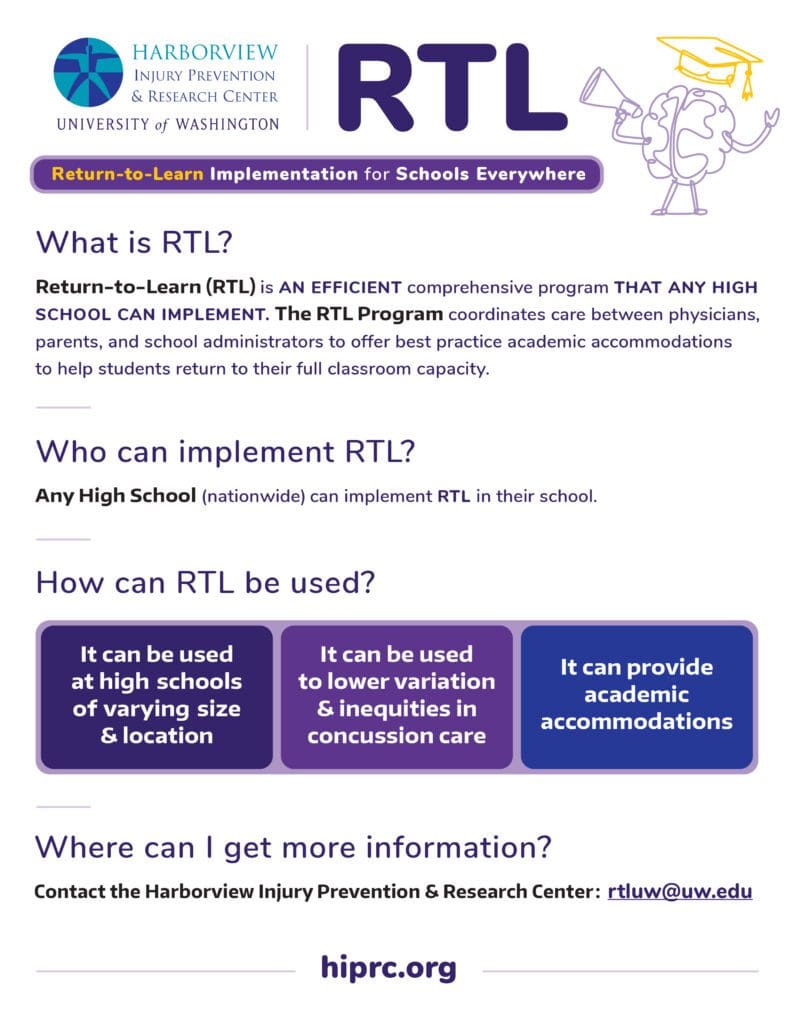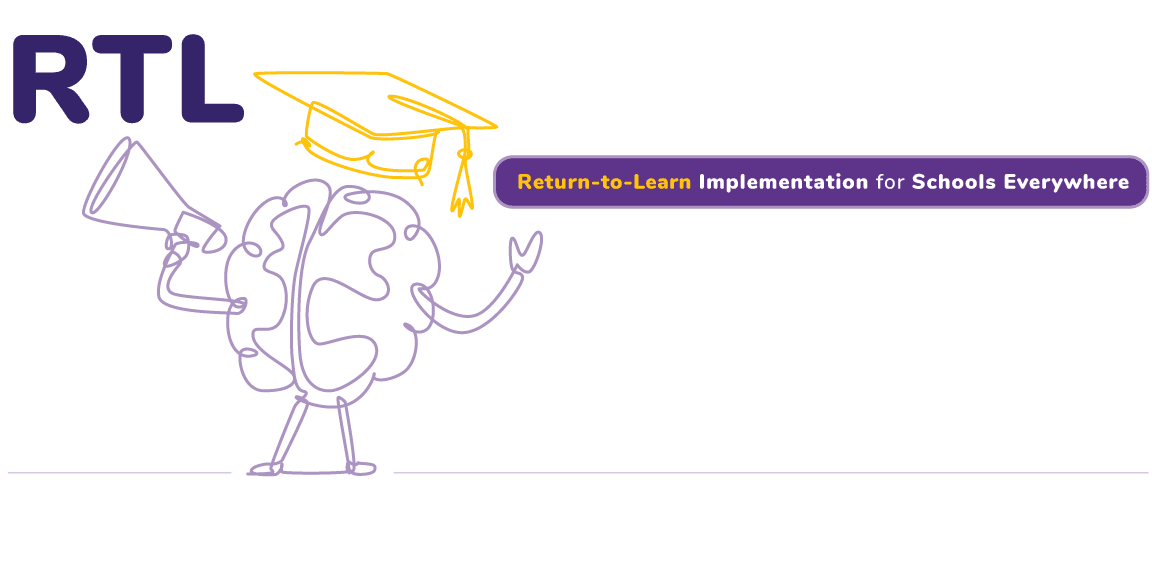
Return-to-Learn (RTL) is AN EFFICIENT comprehensive assessment program THAT ANY HIGH SCHOOL CAN IMPLEMENT. The RTL Program coordinates care between physicians, parents, and school administrators to offer best practice academic accommodations to help students return to their full classroom capacity.
Any High School (nationwide) can implement RTL in their school.
Most concussions resolve within three weeks of injury but during this time, youth experience a wide range of symptoms from physical (headaches, nausea) to cognitive (poor memory, short attention span) and emotional (depression, lability). Unlike other injuries, because of their invisibility and variability, concussions present a very unique set of challenges to schools. While all 50 U.S. states adopted Return to Play legislation, similar nationwide policy-level guidance does not exist to guide students to Return-to-Learn (RTL) and schools are held responsible for their own concussion management.
Guided by community-based participatory research principles, HIPRC has involved local school members, clinical experts, researchers, and students impacted by concussion and their parents to create an evidence-based resource packet to guide schools in managing RTL. The goal of the packet is a quick, appropriate response to student concussions that reduce the risk of long-term impact.
The RTL program provides a step-by-step toolkit and active support for:
For more information, download the HIPRC Return-to-Learn Flier – (PDF)

Return-to-Learn is a fast, comprehensive assessment program for any high school student with a concussion.
It coordinates care between physicians, parents, and school administrators to offer best practice academic accommodations to help students return to their full classroom capacity more quickly. The UW Medicine Newsroom and local media coverage have covered the program in some detail.
The program includes a packet with a weekly checklist to help staff evaluate symptoms, as well as corresponding academic adjustments and accommodations to match.
It also provides information on when students should seek additional treatment, and how to foster coordination between teachers and other applicable school staff to ensure the student’s needs are being met.
This packet allows any school staff to evaluate and make temporary, appropriate recommendations for a student with a diagnosed concussion, ensuring the student promptly returns to a normal workload when sufficiently recovered.
This packet is designed to improve the experience of staff and students with a concussion, not compete with something that’s working well. Use this to enhance your current practice, or use your current practice to enhance this packet. It should be noted that this concussion care program focuses specifically on best-practice academic accommodations and should be followed before the student is evaluated for resuming sports or other athletic activities.
Return -to-Learn differs in a variety of ways. For one, academic accommodations are recommended through routine symptom-based assessment, ensuring that the student’s individual needs are continuously being met, and that accommodations are being tailored to treat their week-by-week condition.
Secondly, it is designed to streamline care and make sure all care providers for the student are practicing the same standard.
Lastly, it allows concussion care to be accessible to anyone and in a trackable and timely format, allowing schools, students, and teachers to map their student’s progress and allowing students to return to the classroom more quickly.
Where can I find more information about Return-to-Learn after concussion?
This plan has been created by synthesizing the best practice recommendations from many sources and the research of the HIPRC. Research done by HIPRC faculty regarding the Return-to-Learn process can be found below.
Thompson, Leah L., et al. “Variations in State Laws Governing School Reintegration Following Concussion.” Pediatrics, vol. 138, no. 6, 2016, pp. e20162151–e20162151.
Vavilala, Monica S., et al. “Community-Engaged Approach to the Development and Implementation of a Student-Centered Return-to-Learn Care Plan After Concussion.” Journal of School Health, 90: 842-848. https://doi.org/10.1111/josh.12948
Vivian H., et al. “Strategies to Address Unmet Needs and Facilitate Return to Learn Guideline Adoption Following Concussion.” Journal of School Health, vol. 87, no. 6, 2017, pp. 416–426.
Learn from experts working in research and community programs around pediatric concussion and the school-based Return-to-Learn program. This webinar discusses the documented need and collaborative development of a school-based program to support high school students returning to school after a concussion diagnosis.

“Our school has identified that one of our weaknesses is communicating between groups in delegating and sharing. Using this packet and thinking about providing specific adjustments for the students makes us more accountable for follow through and communication.”
“The packet helped us have a more formal plan to pinpoint adjustments. It gave us more leeway in releasing them back to the classroom and helping them get better, sooner. They are good recommendations, and the packet has a good flow.”
“The packet complements our current protocol but provides more specific information, and I have been checking in more regularly with the students. It is a very reasonable expectation for the amount of work to do.”
Interested in learning more about traumatic brain injuries (TBI) and how to prevent TBI, visit our TBI homepage >>